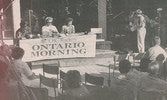Group breathes new life into Rutabaga Festival - Farm 2019
BY DENNY SCOTT
Few places in the world have as strong a claim to the rutabaga as Blyth, especially with the Rutabaga King, A.H. Wilford, being tied to the community.
It’s little wonder, with a pedigree like that, that Blyth was the home of the annual Rutabaga Festival over two decades ago, an event that the Blyth Community Betterment Committee wants to revitalize.
Bringing an agriculture-centred event like that back to life, however, is no easy task according to committee spokesperson Annie Sparling.
The first goal ahead of the committee was to try and raise the money necessary to host the event, and Sparling turned to the idea of raffling off of a brand new Ford F-150 truck as a fundraiser.
“Our first real challenge was trying to sell the tickets,” Sparling said. “We sold half of the 1,000 tickets very quickly, but selling the rest is what’s in front of us right now.”
She said that the committee is hoping to have all the tickets sold by the time the second early-bird draw, for a barbecue, is held in July.
Sparling, one of the driving forces behind the event, said that while she has never attended the Rutabaga Festival, which ended in the mid-1990s, she has heard all about them.
“They seemed like such a great event and everyone had a great time,” she said. “There was a history of fun there and it just seems right to bring it back.”
Produce seems to be a source of inspiration in rural Ontario when it comes to festivals, Sparling said, pointing to events like Port Elgin’s Pumpkinfest, Lucknow’s Strawberry Fest and Lucan’s Bacon Fest, so the Rutabaga Festival, which honours both agriculture and the history of Blyth, makes sense.
Sparling said that, from what she has learned, the downfall of the Rutabaga Festival was volunteer fatigue and, in a community like Blyth that has so many great volunteer organizations and successes to its name, that makes sense.
To that end, the reincarnated Rutabaga Festival won’t be an annual event. Instead it will mark the anniversary of the village’s traditional homecoming every five years. The festival will be held this year, then again in 2022, and every five years after that, Sparling hopes.
“It should be sustainable that way,” she said. “Part of me would love to see it as an annual event, but we don’t want to run into the same problems that the festival ran into over 20 years ago.”
Sparling explained that, right now, the committee is looking for ideas on how to run the event.
“Public input is paramount,” she said. “The public needs to have the festival they want to make sure we have success.”
When asked why the committee was looking to revive the Rutabaga Festival instead of starting something new, Sparling said the history behind the festival plays a part in the decision, but the history connecting the rutabaga to Blyth was more important.
Rutabagas have been a significant industry in Blyth for more than a century and a half, Sparling said, including the vegetable being grown in and around the village. That tradition continues with the G.L. Hubbard Ltd. plant at the east side of the community.
In 1939, Blyth’s rutabaga industry grew with businessman Russel Dougherty starting a rutabaga plant where the vegetables would be waxed for transport.
Dougherty was also an inventor, and built North America’s first precision seeder in 1951, allowing rutabaga seeds to be planted individually instead of sown by hand.
Farmers from Bruce County to Exeter grew the vegetable to bring it to Blyth, where 15 employees would treat the vegetables every winter for processing.
A.H. Wilford, who later became “The Rutabaga King”, promoted the vegetables tirelessly, giving them out to every Member of Parliament in Canada and he even rushed through security to offer one to the Queen of England during her visit to London, Ontario years back.
“When you have a story like that, it makes it an easy decision to follow up on the story,” Sparling said.
Promoting rutabagas is important, Sparling said, because it promotes not only a neglected vegetable, but also supports local businesses.
G.L. Hubbard Rutabagas, for example, sends 95 per cent of its crop to the United States, Sparling said.
The committee recently held its official launch for the event, taking in suggestions from attendees and showing off some of the paraphernalia from the previous festivals.
Sparling said the event went well and the committee has some great ideas about what the event can look like going forward.
For more information, search for the Blyth Rutabaga Festival on Facebook.







